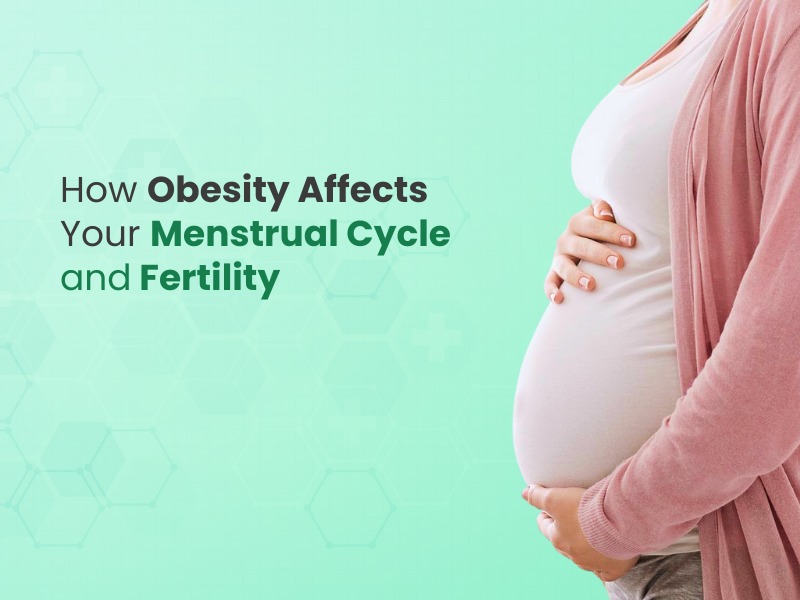
How Obesity Affects Your Menstrual Cycle and Fertility
Being overweight is a health concern, inviting many medical problems with open arms. Among women, it is particularly associated with hormonal imbalance and fertility challenges. If a female gains weight, many are of the opinion that it affects her confidence alone, but that’s not it, as it hampers their overall health too. If you are getting irregular periods then your menstrual cycle has become shorter than usual. It might be a concerning sign. It could be due to a number of reasons, obesity being one of the major ones; hence, it is highly crucial to visit a doctor as soon as you can. We are your go-to guide when it comes to female health and answer how obesity is making matters worse for your menstrual cycle patterns and fertility, with a reminder as to why you need the best Gyno in Ghaziabad.
Here, we shall discuss how obesity affects your Menstrual Cycle
Estrogen and Progesterone: Hormone balance during the menstrual cycle can be disrupted by being overweight or obese, as excess fat tissue (adipose) often triggers hormonal changes. Here’s what usually happens:
Overproduction of estrogen: This is because fat cells secrete estrogen. It is told by doctors that a higher level of body fat increases the chances of estrogen in women, which can throw off their menstrual cycle. This further becomes the primary cause of irregular or missed periods.
Polycystic Ovary Syndrome (PCOS): Obesity usually enhances your chances of getting PCOS. It is a chronic condition identified by infrequent menstruation, an excess of androgen, and polycystic ovaries. PCOS is both a result and cause of weight gain, which only makes management that much more complicated. Symptoms like menstrual changes and infrequent periods can be treated by the top gynecologist in Ghaziabad.
Ovaries without ovulation do not release an egg during the menstrual cycle. Being overweight is also known to affect the hypothalamus and the poor functioning of the pituitary gland, which affects the production of hormones ( FSH, LH) that are necessary for ovulation.
Obesity and fertility: Women who battle excess weight also often wrestle with fertility. Obesity interferes with your reproductive ability, and here is how:
Diminished Egg Quality: Studies suggest that for women with obesity, the quality of their eggs may be lower than those of women of normal weight and fewer in number, which can make it more difficult to conceive with conventional fertility treatment.
Unbalanced Hormones: High insulin resistance and androgen levels can interfere with the ovulation process as well as damage the development of eggs and the uterine lining, resulting in failure of implantation.
More Likely to Suffer a Miscarriage: Obesity makes women more likely to have a miscarriage, which may be caused by hormone imbalances and inflammation.
If you are considering fertility treatments at the best maternity hospital in Ghaziabad, then know that obesity is connected to being overweight, which is linked to lower success rates with In Vitro Fertilization (IVF), mainly due to reduced chances of implantation and a higher risk of miscarriage.
Health Risks Beyond Fertility
Obesity can lead to further gynaecological problems over time and health issues generally, such as:
- Uterine polyps or fibroids
- Endometrial hyperplasia and cancer
- Gestational diabetes and preeclampsia (if pregnant)
- Managing What You Can
That said, if your weight is at the root of your period or fertility problems, keep this in mind. This is how you can OWN IT:
Consult a Gynaecologist: Yes, take the help of the best gynaecologist in Indirapuram or Ghaziabad in order to effectively manage your PCOS or any other menstrual disorder. They can significantly help you in detecting the issues promptly and take the proper steps to ensure timely treatment.
Many times it has been proven that healthy lifestyle changes, such as a good diet and regular exercise, might help in regulating your periods and increase ovulation.
Medications: may be required for some conditions. A top gynaecologist in Ghaziabad might recommend hormone therapy or ovulation-stimulating drugs with a close watch on the patient.
Specialized Maternity Care. If you get pregnant, then being at the top maternity hospital in Ghaziabad makes your pregnancy journey a healthier one for both your baby and you.
When To See a Gynaecologist?
So, if you’ve got no luck with regular periods, you ought to be consulting a specialist, or else if your periods are too heavy or infrequent, then it indicates there’s something abnormal with the menstrual cycle, and hence you should visit a healthcare professional. Explore for the top gynae in Ghaziabad or schedule an appointment with the Best Gynaecologist in Ghaziabad for personalized care.
Executive guidance can often be the difference between being reactive and proactive. From regular wellness checks to help with fertility problems, the best gynaecologist in Indirapuram or Ghaziabad can accompany you on your health journey.
Also Read: 3 out of 5 Indian Women Will Face One of These Health Issues
Warning: Undefined array key -1 in /mnt/ebs_new_vol_1/yashoda-medicity/public_html/blog/wp-content/themes/wpxon-blog/template-parts/content-single.php on line 85
